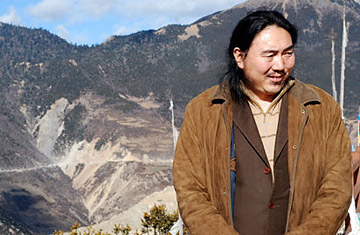
Karma Samdrup in 2008
A prominent Tibetan arts dealer and environmentalist was sentenced to a 15-year prison term by a Chinese court on Thursday for buying antiques looted from tombs — charges his supporters say were drummed up after his family crossed powerful officials in Tibet.
Karma Samdrup, 42, is an unlikely political prisoner. Ahead of his conviction, he had been considered a model Chinese citizen: the domestic press praised him for founding the Three Rivers Environmental Protection group, a prizewinning NGO that champions conservation on the Tibetan plateau, and in 2006 state broadcaster China Central Television (CCTV) named him philanthropist of the year for "creating harmony between men and nature." The only smudge on his reputation came in 1998, when police charged him with buying $10,000 worth of 7th century rugs, embroidered pillows and shoes that thieves had looted from archaeological sites in the northwestern Xinjiang region. Officials dropped those charges after Samdrup denied knowing that the items had been stolen and produced a license permitting him to buy and sell relics.
But police reinstated the charges earlier this year. Human-rights groups see the move as retaliation for Samdrup's lobbying efforts to free his brothers, Jigme Namgyal and Rinchen Samdrup, from the prisons where they have been detained since August; the two men had run afoul of local authorities after accusing them of poaching. Namgyal is serving a 21-month sentence in a labor camp for "harming national security" by setting up an illegal NGO, and Rinchen Samdrup's trial for "inciting separatism" has been delayed, according to the International Campaign for Tibet.
The legal actions against the family have raised concerns that since the deadly riots in Tibet in 2008, Chinese authorities are pursuing a harsher line not only against Tibetans who challenge the government's authority but also against people like Samdrup who have no history of political activism. "If a dissident or a monk or whoever challenged the system, [they'd get] a lengthy prison sentence. That happens all the time," says Nicholas Bequelin, a researcher for Human Rights Watch in Hong Kong. "But these people had nothing to do with that. These people are exactly the type of Tibetans the government says it wants — economically successful people who support government initiatives on environmental protection."
During his trial, which began on June 22, Samdrup told the court that he had been subjected to extensive torture — including sleep deprivation and repeated beatings. "The account we heard ... exceeded our worst imaginations," his wife Dolkar Tso wrote in a blog post that was translated by High Peaks Pure Earth, a website that monitors Tibetan source material. "We heard about hundreds of different cruel torture methods, maltreatment around the clock, hitherto unheard of torture instruments and drugs, hard and soft tactics, and even of fellow prisoners being grouped together to extract a confession."
Pu Zhiqiang, Samdrup's lawyer, tells TIME that his client plans to appeal. "The verdict was neither based on facts nor on law, and the procedure was completely illegal," he says. "It was unconvincing and should not have legal effect." Pu also questions why Samdrup has been convicted now, more than a decade after a court first heard — and dismissed — the charges. "There's absolutely no new evidence being presented in this case, and yet he is now found guilty."
